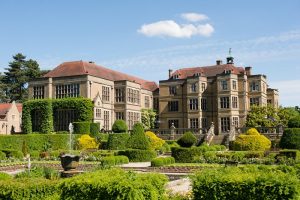Roles of Lipids in Nuclear Homeostasis and Genome Stability
Organisers: Aurélia Lewis and María Moriel-Carretero
Date: 14-17 October 2024
Location: Fanhams Hall, Hertfordshire, UK
Along with nucleic acids, proteins, and carbohydrates, lipids are one of the four major biomolecules in living organisms. Cellular processes are mediated by the concerted action of these biomolecules, thus giving rise to complex interaction networks. Yet, while two-thirds of the cell proteome is in constant interaction with multiple lipid species, there is a poor definition of this type of interaction specifically within the nucleus, and almost none of lipid-nucleic acid interactions. This disequilibrium relates to historical reasons, but also to the difficulty of applying classical lipid-related techniques to a territory such as a nucleus. As a consequence, the limited research in this domain translates into scarce and rarely gathered information, further discouraging new initiatives.
Yet, the nucleus is delimited by a double membrane bilayer. It is pierced by invaginated membrane-derived structures, such as the nucleoplasmic reticulum, and harbors enigmatic lipid droplets. Membrane-less organelles in the nucleus such as the nucleoli, the splicing speckles or even DNA repair foci harbor different phosphoinositide species. The biology of chromatin (and of chromosomes) is profoundly modulated by physical and genetic interactions with phospholipids. And even the processes ruling DNA damage signaling and repair emerged recently as controlled by lipids.
The time has come that the roles of nuclear lipids are defined as a well-established discipline. This Workshop gathers actors of lipids and nuclear biology working world-wide, and will foster exchanges, install the realisation of a legitimate and coherent community, seed new collaborations, establish self-determination and visibility.
Organisers & speakers
Aurélia E. Lewis University of Bergen, Norway
María Moriel-Carretero Center of Research in Cell Biology of Montpellier, France
Wolfram Antonin RWTH Aachen University, Germany
Shirin Bahmanyar Yale University, USA
Raymond Blind Vanderbilt University Medical Center, USA
Marie-Edith Chabouté Institut de Biologie Moléculaire des Plantes, France
Irene Chiolo University of Southern California, USA
Orna Cohen-Fix NIDDK, National Institutes of Health, USA
Nullin Divecha University of Southampton, UK
Toyoshi Fujimoto Juntendo University, Japan
Alwin Köhler Max Perutz Labs, Austria
Félix Machín Unidad de Investigación, HUNSC, Spain
Krishnaveni Mishra University of Hyderabad, India
Snezhana Oliferenko The Francis Crick Institute, UK
Neale Rigdway Dalhousie University, Canada
Christian Schlieker Yale University, USA
Robert Semple University of Edinburgh, UK
Symeon Siniossoglou University of Cambridge, UK
Cunqi Ye Zhejiang University, China
Vanina Zaremberg University of Calgary, Canada
Early-career researchers
Applications for this Workshop have now closed.
We offer up to 10 funded places for early-career researchers (PhD, postdocs and PIs in the first three years of their first appointment) to attend our Workshops along with the invited speakers. We just ask that you pay for your own travel costs. If you would like to attend, please complete the online application form and include a one-page CV, a letter of motivation (1 page maximum) and, only in the case of PhD candidates and postdocs, a letter of support from your supervisor. If your supervisor would prefer to send the letter directly to us please ask them to email it to workshops@biologists.com.
All attendees are expected to actively contribute to the Workshops by asking questions at presentation sessions and taking part in discussions, as well as giving a short talk on their research.
At some Workshops, early-career researchers are given additional responsibilities to promote their involvement, such as:
- Write a daily blog for the Node
- Summarise the previous day’s themes to set the scene for the next day’s sessions
- Propose future directions and collaborations
- Make a short two minute video on their experience at the Workshop
Most of these activities would be carried out in pairs or small groups and often with the support of more senior scientists present.
N.B. To make sure we have a wide diversity of topics, we favour applications from early-career researchers who are not working in the same research groups as our invited speakers.
About Fanhams Hall

The Workshop will be held at the beautiful Fanhams Hall in Hertfordshire. An exceptional combination where old tradition meets the 21st century, Fanhams Hall Hotel is a Jacobean Manor House. Set in 27 acres of stunning Grade I listed grounds it boasts many features including a Grade II listed Japanese Tea House and formal gardens.
The hotel’s Hertfordshire location is just a short distance from all the major routes into London, Stansted, M1, M25 or simply the A10 just around the corner.
Fanhams Hall
Fanhams Hall Road
Ware
Hertfordshire
SG12 7PZ
United Kingdom
Tel: +44 (0)1920 460511








You must be logged in to post a comment.